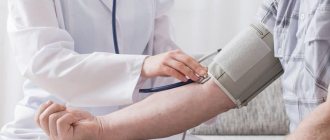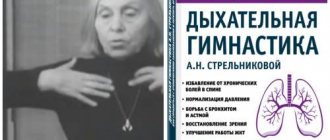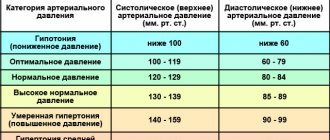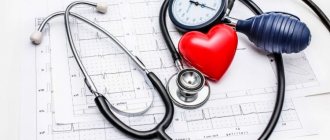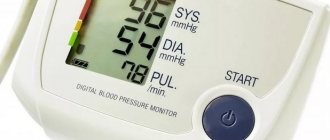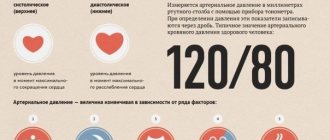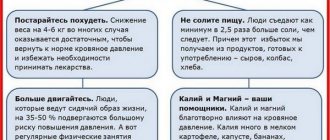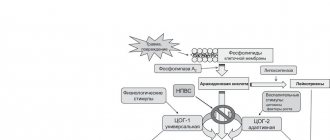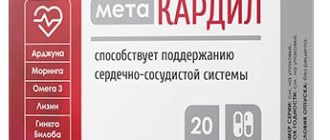High blood pressure of 240 indicates the development of a hypertensive crisis. This condition is extremely dangerous and can cause a number of serious complications for the body, and sometimes even lead to death. When the pressure rises above 200 mm Hg. Art. It is important to immediately call an ambulance, and then try to calm the patient and carry out rescue procedures until the team arrives.
Reasons for this pressure
An increase in blood pressure to 240 mmHg can be caused by the following factors:
- untimely use of medications that lower blood pressure;
- traumatic brain injury;
- abuse of alcohol and caffeinated drinks;
- smoking;
- unhealthy and unbalanced diet;
- cancer;
- sudden climate change;
- stress.
How does it manifest?
The main symptom that indicates the development of a hypertensive crisis is a gradually increasing pain in the head. Patients complain of pain in the frontal and temporal zones. Unpleasant sensations can radiate to the neck and jaw. The pain is often accompanied by dizziness and an increase in heart rate up to 150 beats per minute. In addition, you can suspect blood pressure of 240 over 100 based on the following signs:
Shortness of breath and lack of air with high blood pressure may signal a developing pathological condition.
- redness of the skin of the neck and face;
- trembling hands;
- chills;
- attacks of nausea and vomiting;
- feeling of fear and panic;
- dyspnea;
- lack of air;
- deterioration of visual and auditory functions;
- increased sweating;
- impaired coordination of movements.
Why is it dangerous?
A strong increase in blood pressure can cause serious consequences. During a hypertensive crisis, myocardial infarction or stroke often occurs. Blood pressure of 240 can contribute to the development of heart failure. In addition, a persistent increase in blood pressure can trigger kidney failure, as well as pulmonary edema. If the patient is not provided with timely assistance, death cannot be ruled out.
Symptoms of hypertension
You cannot ignore the symptoms of high blood pressure; they will help prevent the dangerous consequences of hypertension in time.
Often there are no signs of increased blood pressure of the hypertensive type, which is why developing hypertension is also called the “silent killer”. It’s just that one day a person suffers a heart attack or stroke due to another surge in pressure, even an insignificant one against the background of the general excess. Interruptions in heart rate, nausea, causeless anxiety, heart pain, darkness before the eyes followed by loss of consciousness, migraine, loss of coordination - all these are symptoms of hypertension.
Urgent Care
When the mark on the tonometer reaches 240, it is recommended to immediately call an ambulance.
When a person's blood pressure rises to 240 millimeters of mercury, it is important to immediately call an ambulance. Before the team arrives, you will need to ventilate the room and take a horizontal position. To help the patient calm down, he should take a sedative. For these purposes, doctors recommend using tinctures of valerian or motherwort. In addition, Corvalol can also be used. Take the medicine with a sufficient amount of warm water.
Then you will need to take a medication that lowers blood pressure. Clonidine, Captopril and Nitroprusside are often used. After the ambulance team arrives, the doctor clarifies what diagnosis was given to the patient and what kind of pills he was prescribed in the hospital. Then the doctor begins to measure the pressure.
When a person's condition is serious, he is hospitalized.
Causes of high blood pressure
For each person, depending on age and the presence of chronic pathologies, blood pressure varies from the norm to 120/80. Therefore, an attack of malaise can occur even with a slight excess. But when blood pressure rises to 240 or even higher, this threatens complications. Internal organs such as kidneys, heart, and brain are affected. Such an attack can lead to consequences in the form of poor vision or its complete loss. The reasons for this pressure may be:
Enter your pressure
Move the sliders
120
on
80
- constant worries, stress;
- genetic disposition;
- environment;
- high fat content in the diet (butter, sour cream, sausage, cheese, cakes);
- a large amount of alcohol consumed, which directly affects the heart rate (changes towards an increase);
- high salt content in food, which leads to fragility of blood vessels;
- sedentary work, sedentary lifestyle;
- smoking;
- overweight;
- complication after illness.
What to do?
Drug therapy
To normalize the patient’s condition, the doctor will prescribe inhibitors and set the exact dosage.
To lower blood pressure from 240 to 120, the patient is prescribed angiotensin-converting enzyme inhibitors, calcium antagonists, and alpha-blockers. Sometimes diuretics can be used in combination with them. A sharp decrease in blood pressure can provoke serious complications, so therapy usually begins with minimal dosages of drugs, after which they are gradually increased. It is important to remember that the correct medicine and the duration of its use can only be determined by the attending physician, who takes into account the severity of hypertension and the individual characteristics of the patient. Treatment of high blood pressure is carried out throughout life, since stopping the use of medications can contribute to the development of a hypertensive crisis.
ethnoscience
Doctors draw the attention of patients to the fact that resorting to prescriptions from healers to lower blood pressure is permissible only after consultation with a specialist. To lower blood pressure, it is recommended to add black currant leaves to weak tea. This medicine should be taken daily. Viburnum, the berries of which can be eaten both fresh and dried, will also help to reduce blood pressure. In addition to using traditional medicine, it is recommended to follow a daily routine in which sufficient time is devoted to sleep and rest. You need to sleep at least 7 hours a day. You should walk in the fresh air for at least half an hour every day. It is important not to forget about the drinking regime. You should drink at least 1.5 liters of fluid per day, unless a person has contraindications for this.
Dangerous symptoms
First aid for high blood pressure must be provided competently and immediately.
If there is no one nearby at this moment, a person who has an attack of hypertension should know how to behave in such a situation, waiting for the medical team. Often the patient simply does not notice high blood pressure. He may not feel any signs of ill health or, unknowingly, may not associate them with hypertension. This “negligent” attitude towards oneself is especially typical for people who are encountering a similar phenomenon for the first time. An asymptomatic course usually characterizes the initial stage of the disease. You can notice an increase in pressure only by measuring it. This can be done using a tonometer.
If the device shows numbers exceeding the permissible values of normal pressure (139/90), then the body has already sent the first alarm signal. Of course, this may be a one-time and minor rise, which sometimes happens to any person; it does not require medical attention. This can be checked by regularly measuring pressure over a certain period of time. Having noted episodes of periodic deviation of its indicators from the norm, one must seriously realize and accept the fact that one has hypertension.
In order not to miss the onset of hypertension, the following symptoms should not be ignored:
- headaches, which can be felt in any area, are strong and moderate, prolonged and paroxysmal;
- often pain in the head is associated with a feeling of nausea, vomiting is possible;
- the patient feels a buzzing in the ears, heaviness in the head, pulsation of blood in the temples;
- your head is spinning, the ground “goes away from under your feet,” your vision becomes dark, especially if you suddenly stand up from a sitting or lying position;
- the heart aches and hurts, you feel heat and heaviness in the chest, the pain can be squeezing;
- the heart rate becomes erratic or quickens;
- it becomes difficult to breathe, as if there is not enough air;
- fever or chills may appear, trembling in the limbs, arms and legs become numb and cold;
- blurred vision, flashing black spots appear before the eyes, difficulty focusing;
- there is pain in the eyeballs;
- possible nosebleeds;
- sleep problems;
- nervous excitement, manifested by irritation;
- apathy, loss of strength, lethargy, drowsiness.
Usually you can cope with the manifestations of hypertension on your own. Experienced hypertensive patients have a whole arsenal of proven medications for these cases.
But there are times when even they need emergency help for high blood pressure.
If the readings have increased to significant levels (30% above the usual level), you need to call an ambulance. For each person, the norm will be its own indicator; it may differ markedly from generally accepted standards (120/80).
One person will feel comfortable with a blood pressure of 135/85, while another lives with low blood pressure of 90/60 all his life. And for people with chronic hypertension, a slight increase in tonometer readings is practically the norm; the vessels have already adapted to this condition. Therefore, the concept of “high blood pressure” is quite relative. A hypotensive person will feel very bad already with readings of 140/90, and an experienced hypertensive person will call an ambulance if the pressure “jumps” to a level higher than 180/110.
The reason for providing first aid for hypertension should be the patient’s condition, and not the tonometer readings: if a person feels unwell, there is no one nearby, and he himself is not able to help himself, then an urgent need to call a doctor.
Poor health with pressure can be expressed by increased headache, vomiting, weakness bordering on fainting, the appearance of blurred vision, severe pain in the heart area. Symptoms that are typical for hypertension become pronounced, the person has a fear of death, it is difficult for him to breathe, and he becomes covered with red spots.
An emergency call to an ambulance will be needed if the medications taken and other measures to reduce blood pressure do not help, and also if the person has experienced an attack of hypertension for the first time.
A very dangerous phenomenon is a sudden sharp jump in indicators to high limits. This condition is called hypertensive crisis. In this case, first aid for high blood pressure should be provided immediately. What symptoms indicate danger:
- unbearable headache, weakness, nausea;
- arms, legs, face go numb, and often such symptoms are characteristic of one of the parts of the body: left or right;
- loss of vision.
These are signs of an incipient stroke, the outcome of which can be paralysis, coma, or death.
Here are the symptoms that precede the development of a heart attack:
- burning in the chest, not always in the heart area;
- pain extending into the arm, shoulder, or both arms;
- sometimes pain is felt in the jaw, teeth, shoulder blades or back;
- it becomes difficult to breathe;
- You may experience a feeling of a full stomach, heartburn, and your stomach begins to ache;
- interruptions in heart rhythm.
This is how acute heart failure manifests itself, which requires immediate medical attention:
- blueness of the tips of the fingers and toes, blueness in the lips;
- severe shortness of breath;
- arrhythmia;
- the appearance of pink foam at the mouth;
- coughing;
- heartache.
When complications of arterial hypertension develop, help is provided in different directions: reducing blood pressure and eliminating the symptoms of the accompanying complication. In this case, medications will be needed to support the heart muscle or relieve cerebral edema.
Preventive actions
To prevent a strong increase in blood pressure, the first thing you need to do is take antihypertensive medications in a timely manner. In this case, it is important to follow the dosage and regimen of their use, which was established by a specialist. It is important to refrain from self-medication and independent replacement of prescribed medications with their analogues. This is due to the fact that each medicine has its own contraindications and side effects, so their use must be agreed with a doctor.
In addition, proper nutrition will also help reduce the risk of high blood pressure. People suffering from hypertension will need to exclude fried, fatty, spicy and excessively salty foods from their diet. The menu should be based on vegetables and fruits, products that contain sufficient amounts of microelements and vitamins. It is imperative to exclude the consumption of alcoholic beverages, as well as smoking. Doctors recommend leading an active lifestyle and engaging in gentle sports. Therapeutic physical training, swimming, yoga will be beneficial. Hypertensive patients should constantly monitor blood pressure readings and seek help if they increase.
Pills and medicines
A quick way to help a person is to give him the right pills. When deciding on the choice of medications that help with hypertension, you need to remember one important rule: a sharp drop in blood pressure can only worsen the situation. It must be reduced gradually. It is good to choose exactly those drugs, the effect of which appears a short time after administration, but the blood pressure will decrease smoothly, without jerks.
For hypertension, the following groups of drugs are used:
- Blockers of calcium ions, which settle on the walls of blood vessels, increasing their volume and causing an increase in pressure.
- ACE inhibitors (angiotensin-converting enzymes) block the production of an enzyme that, by causing certain transformations of substances in the body, contributes to an increase in blood pressure in humans.
- Diuretics are drugs that remove fluid from the body. They normalize kidney function, eliminate swelling, and reduce blood pressure.
All three groups of drugs complement each other well and act more effectively when used together. They are represented by the following drugs:
- "Amlodipine", "Felodipine".
- "Captopril", "Enalapril", "Fosinopril".
- "Hydrochlorothiazide", "Indapamide".
"Amlodipine" has a soft, smooth effect. Vascular resistance decreases slowly, which helps avoid increased heart rate. The drug is also used for ischemic heart diseases. Do not use in case of low blood pressure, cardiogenic shock, myocardial infarction. The use of these tablets may cause side effects: pain in the heart or head, increased appetite, frequent urination.
"Captopril" can be used as first aid for a person with high blood pressure, as well as for the systemic treatment of hypertension. Effectively lowers blood pressure to acceptable limits, effective within an hour or an hour and a half after administration. The drug does not contribute to fluid retention in the body, so it can be taken without diuretics. It facilitates the work of the heart and improves the functioning of the kidneys.
“Hydrochlorothiazide” removes fluid, relieves swelling in cases of high blood pressure, heart failure, and renal failure. Possible side effects: nausea, diarrhea, tachycardia, hyperglycemia, dizziness, blurred vision. It is not recommended for use in cases of liver failure, impaired renal function, or severe diabetes.

